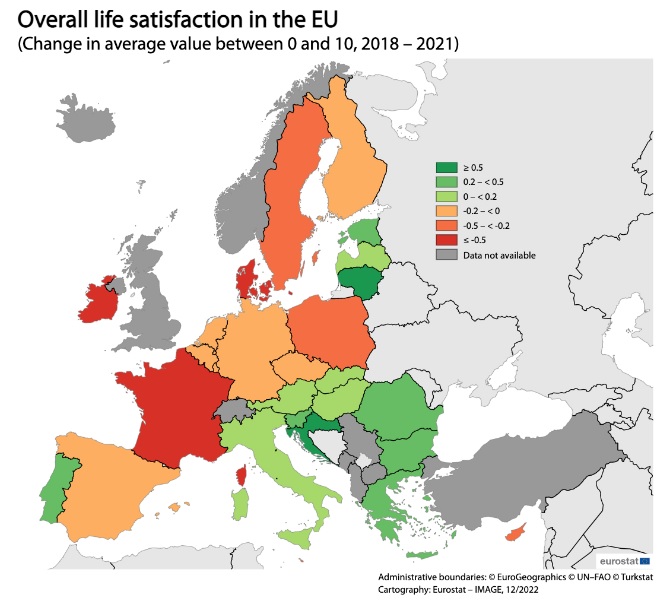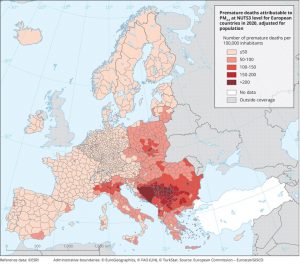As a probable reflection of the COVID-19 pandemic’s impact on people’s lives, data on overall life satisfaction in the EU show that in 2021, EU citizens were slightly less satisfied with their lives than in 2018.
The EU average decreased by 0.1 points from 7.3 in 2018 to 7.2 in 2021 (on a scale from 0 for very dissatisfied to 10 for very satisfied). Even with that small decrease, this indicator remained high and above the 2013 average (7.0 points).
In 2021, life satisfaction was highest in Austria (8.0 points), Finland (7.9), Romania (7.7) and the Netherlands (7.6) and lowest in Bulgaria (5.7). Hungary also showed quite a low level of satisfaction (6.5) but higher than 6, which means satisfied rather than dissatisfied.
Compared with 2018, 14 Member States registered a decrease in overall life satisfaction and a general converging trend can be noted: satisfaction decreased in Member States with higher levels of satisfaction and those with low life satisfaction saw the opposite trend. The biggest decrease (-0.8 points) was in Ireland, which topped the 2018 list, from 8.1 points to 7.3 in 2021. This was followed by France and Denmark, both with a 0.5 points decrease to 6.8 and 7.3 points, respectively. In contrast, overall life satisfaction increased in Lithuania (+0.6) to 7.0 points, in Croatia (+0.5) to 6.8 points, and in Greece and Romania (+0.4 each) to 6.8 and 7.7, respectively.
Life satisfaction increases with education and decreases with age
On average, the level of life satisfaction of men and women was slightly lower for women: 7.2 and 7.1 points, respectively. When compared with 2018, life satisfaction decreased in a similar way for men and women at EU level (-0.2 points each).
Data also showed two patterns: life satisfaction consistently decreased with age and increased with the level of education, meaning that the higher the education level, the more satisfied people tended to be with life, but the older they got, the less satisfied they felt. The second is however not true for all the Member States.
In 2021, those with a higher level of education (7.5 points; -0.3 points than in 2018), and to a lesser extent, those with secondary education (7.2 points; -0.2 points), rated their life satisfaction on average lower than in 2018, while for those with primary education the value was stable (6.8 points).
In terms of age, in the EU as a whole, in 2021, the level of life satisfaction was 7.5 for the youngest generation surveyed (16-29 year olds), 7.2 for people over 16, and 6.9 for people over 65 years old. In these three age groups, life satisfaction also decreased compared with 2018, but the youngest generation (16-29 year olds) registered the biggest decrease.
Source: Eurostat


